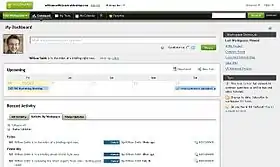Central Desktop
iMeet Central (formerly Central Desktop) is a collaboration software owned by PGi (acquisition announced in October 2014[1]). The company's primary focus is providing a Software-as-a-Service collaboration tool to small and medium-sized businesses. The company and its products are most often compared to other wiki-based and project-centric solutions such as SharePoint and Basecamp.[2] As of November 2013, the company serves more than 650,000 users worldwide[3] with customers such as Gymboree, Nielsen, CBS, The Ritz-Carlton, Netflix and Harvard University.[4]
 A dashboard view, seen within Central Desktop | |
| Developer(s) | Central Desktop |
|---|---|
| Operating system | Cross-platform |
| Type | Collaborative software |
| Website | imeetcentral.com/ |
History
The company was founded by CEO Isaac Garcia and CTO Arnulf Hsu in 2005. Prior to founding Central Desktop, Isaac and Arnulf started Upgradebase in 1997, a product data provider to the computer and consumer electronics industry, and Vendorbase in 1999, a B2B marketplace for computer resellers. Both companies were acquired by CNET Networks in 2002.[5]
In December 2006, the company accused Google of unfairly competing against its own customers by bidding on keywords that Google held an interest in.[6] Google responded to the accusations on its own AdWords blog.[7]
Central Desktop received $7 million in first round funding from OpenView Venture Partners [8] in April 2008.[9]
In October 2014, Central Desktop was acquired [10] by PGI (Premier Global Services, Inc.) and rebranded to iMeet Central in November 2015.[11] There are no more community edition available and so users are now restricted to paid services.[12]
Products
Central Desktop is offered in two editions - Workgroup and Enterprise.[13]
In February 2010, the company released version 2.0 of its software, Central Desktop 2.0. New features in Central Desktop 2.0 include an online file viewer that supports more than 200 different file types, improved wiki navigation and the ability to convert any file type into a downloadable PDF document.[14]
Central Desktop product features include:
- Wikis
- WYSIWYG editing
- Document management
- Integrated Lucene search (full text searches for Word, Excel, PowerPoint and PDF files)
- Online documents
- Online spreadsheets
- Task management
- Discussion threads
- Online file viewer
- Web conferencing
- Workflow solutions
- Microblogging
See also
References
- "PGi Acquisition of Central Desktop signals industry shift to unified collaboration". Oct 16, 2014.
- "InformationWeek, serving the information needs of the Business Technology Community".
- "Best Project Management Software 2021 | Reviews of the Most Popular Tools & Systems".
- "Central Desktop's 2.0 Upgrade Focuses on User Interface - PCWorld". www.pcworld.com. Archived from the original on 2010-02-25.
- "Deal Radar 2009: Central Desktop". 3 February 2009.
- "Google's Silent Monopoly (Or How Much Does Google Pay For Its Own AdWords?) - Central Desktop Blog". cdblog.centraldesktop.com. Archived from the original on 2009-01-15.
- "Google advertising on AdWords?".
- "Home". openviewpartners.com.
- "Central Desktop Takes $7 Million".
- "PGi Acquisition of Central Desktop Signals Industry Shift to Unified Collaboration".
- "Central Desktop is now iMeet® Central. What's next? -". 19 November 2015.
- "IMeet Central pricing |".
- "Central Desktop SaaS Collaboration Now Available on Intuit App Center".
- "Retirement Investments | Planning for Retirement Made Simple".